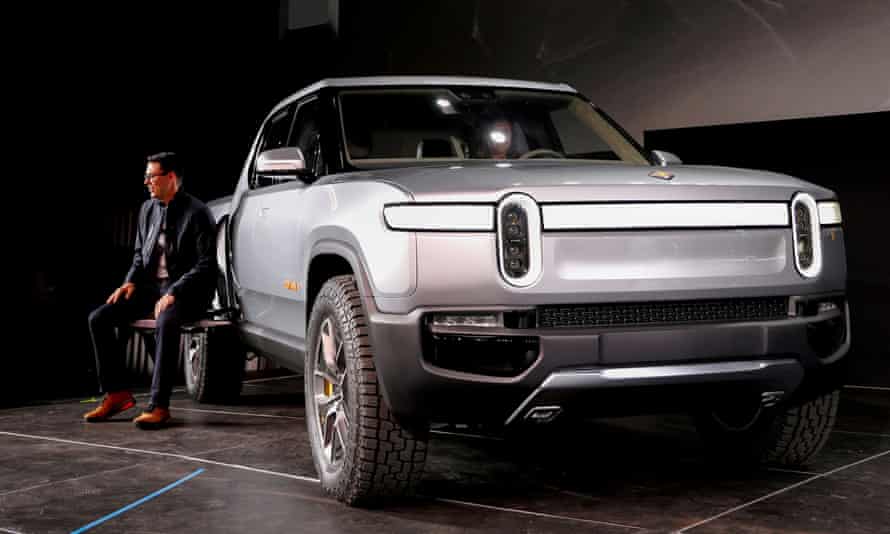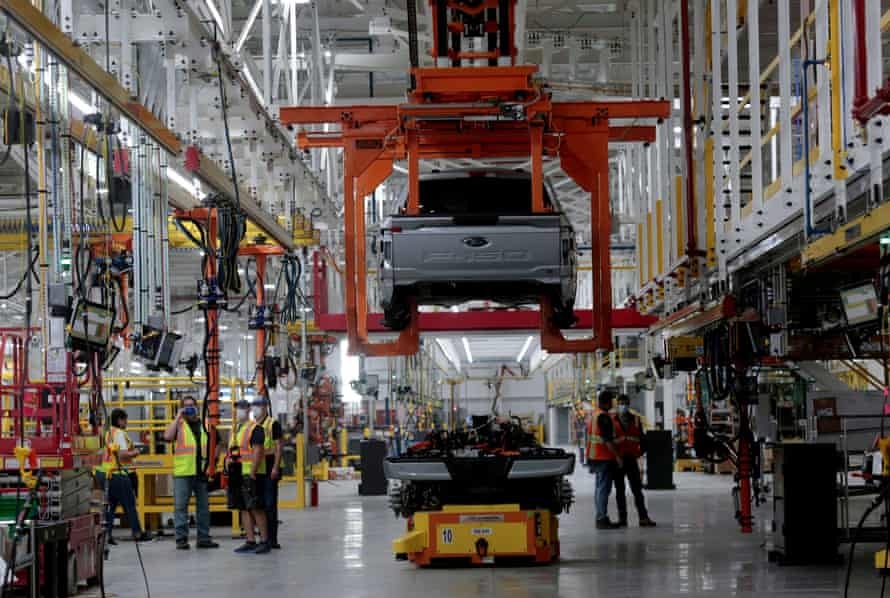Will Rivian’s electric vehicles end Detroit’s reign over the US auto business? | Electric, hybrid and low-emission cars
nOrmal, Illinois, a city of just 55,000 residents, could at least be the future of auto manufacturing, according to Wall Street dealers. A six-hour drive away in Detroit, home to the US auto industry for more than 100 years, you’re not so sure.
The city gained international attention earlier this month after Amazon-backed Rivian, an electric vehicle startup, went public in one of the biggest public debuts since Facebook. Despite the fact that the company only shipped about 150 trucks, Rivian is now valued at about $ 100 billion, more than either Ford or General Motors, which together produced about 10 million vehicles in 2020.
Investor craze for Rivian – especially after its electric vehicle rival Tesla hit $ 1 trillion – has re-raised the question of whether Detroit’s centuries of rule over the auto industry are in jeopardy. But not all are convinced.
“People were quick to fire the old guard as new players came in and tried to take the lead, but I don’t think that will happen because Ford and GM are so well positioned with their logistical production chain.” said Jessica Caldwell, executive director of insights at automotive analyst Edmunds.
 RJ Scaringe, CEO of Rivian, will present the fully electric R1T pickup from his company in Los Angeles in 2018. Photo: Mike Blake / Reuters
RJ Scaringe, CEO of Rivian, will present the fully electric R1T pickup from his company in Los Angeles in 2018. Photo: Mike Blake / Reuters
Still, the upstart momentum shouldn’t be discounted, and the company’s clear vision, iconic “cool factor,” and potential are legitimate forces driving the stock’s rise. Rivian’s stylish R1T electric trucks have received rave reviews and another 55,000 more orders are expected. The company announced plans for a second plant in the days following its IPO, will launch an electric SUV next month, and is ambitiously aiming to grow production to one million vehicles per year within a decade.
The company has strong support. Amazon, Rivian’s largest funder, owns a 20% stake in the company and has an order for 100,000 electric vans to deliver packages to e-commerce customers, while Ford’s 12% stake gives even more legitimacy, though the two vehicle development plans have ended together.
However, skeptics say that simple math, on the reverse, raises doubts. Rivian has attracted some of the best manufacturing logisticians in the industry to manage its growth, but scale-ups are extremely difficult and the company plans to move at an unprecedented pace that Tesla would surpass in its early years, said Brett Smith, technology director at the Center for Automotive Research in Michigan. “Actually getting a certain amount of this to customers is no small feat,” said Smith.
At $ 70,000 per truck, valuation of the company at its height implied it would sell around 3 million vehicles, or about 12% of the auto market, in 10 years, said David Trainer, founder of investment research firm New Constructs. That is more than BMW sold last year.
New Constructs estimates Rivian to be worth “at best” $ 13 billion, and Trainer called the IPO “insane.”
“The underlying business model may work, but there is no reason to pay a price [for stock] that means they will effectively put Ford out of business, ”he said.
It took Tesla about five years to start production on a second line, and it’s on track to produce fewer than a million cars 12 years after going public. Tesla also captured its market share while being the only real player in electric vehicles (EVs). A week after Rivian went public, GM launched its electric Hummer, while Ford’s F-150 Lightning, the first electric version of its bestseller, launched earlier this year, already has 150,000 pre-orders. Tesla customers account for 11% of those sales.
The EV market is expected to gain momentum in the coming years. GM and Ford each aim to sell 1 million EVs annually by 2025, and will likely do so at a lower price that will appeal to the mass market more than the early adopters and luxury buyers who make up most of Rivian’s customers.
 The body and chassis of an all-electric Ford F-150 Lightning prototype truck in Dearborn, Michigan, in September. Photo: Rebecca Cook / Reuters
The body and chassis of an all-electric Ford F-150 Lightning prototype truck in Dearborn, Michigan, in September. Photo: Rebecca Cook / Reuters
Traditional automakers also have the infrastructure to ramp up production much faster than Rivian – Ford announced plans for the Lightning in late 2020 and will ship the first batch by early 2022, a process that took Rivian about six years. That is tied to Ford’s built-in brand loyalty and an established marketing operation that sells products with household names, noted Caldwell.
“The Ford 150 Lightning – it’s tough to compete with its price, brand, and sheer Ford marketing and advertising muscles,” said Caldwell.
Traditional automakers have also set up a network of dealerships to service new products when the inevitable hiccups hit, Smith noted. This could frustrate Rivian and present a costly logistical challenge when a car breaks down.
“Rivian is exciting, Rivian has a lot of positives, but they still have no evidence to support their vehicles on the road,” said Smith. “That doesn’t mean they won’t, but it could be a huge problem for consumers and commercial buyers.”
Though Rivian’s IPO left it with an impressive $ 11 billion in cash, Ford and GM coffers are somewhat negating that advantage, Trainer said. Capital can be a huge plus for a tech company like Netflix, but it’s “nowhere near as effective as a weapon in producing old production lines because your competitors have lots of capital too,” he added.
Still, there are reasons for Detroit to be concerned and the automaker’s legacy cuts both ways, Smith said. Businesses need to figure out how to efficiently reduce combustion production while increasing EV production, a challenge Rivian doesn’t have to face.
“If you don’t have to worry about spending money on the inheritance, all you have to do is develop the new product, technology and processes, and if you have access to cash you could be at an advantage,” he said.
Although Ford seemed a little unprepared for the EV move a few years ago, analysts say the F-150’s rapid mobilization has put an end to all skepticism and the company has been “able to keep an eye on the competition” in a way that showed that it was ready. And by the end of the week, Rivian’s share price fell as investors took profits and the number of unanswered questions weighed on the future.
“I could be wrong about that, but like any hype, any bubble, and this is a bubble, there will be some big winners and there will be a lot more losers,” said Smith. “I suppose that will be the case here. In 125 years of the automotive industry there have been many startups … and most of them have failed. “



Comments are closed.